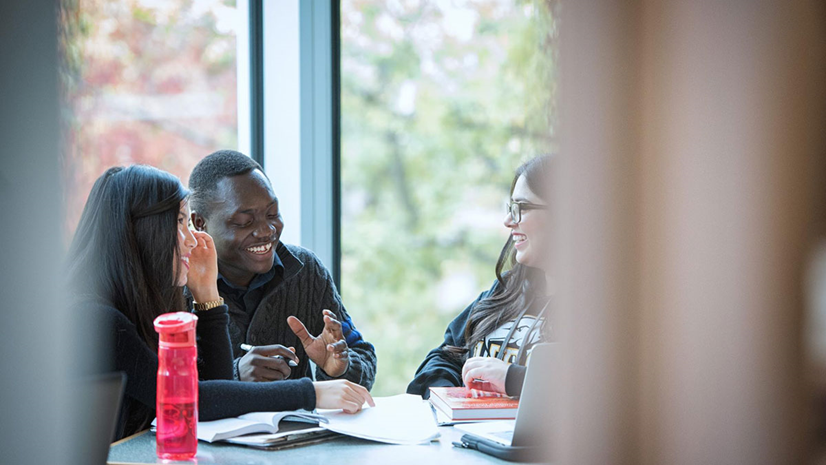Guest post by Phoebe Lee (Master’s student, Higher Education)
Anytime coursework begins to pile up, it is important for students to know important tips on studying and maintaining personal wellness. This blog post will mainly focus on study tips, but I wanted to acknowledge that mental and physical wellness is also part of studying. Personal health and wellness benefit a successful academic and professional career here at UBC. My study tips will include effective studying, note taking, and hopefully some techniques for concentration when preparing and studying for classes. Time management is also extremely important to your study journey, and this post includes tips on managing your own personal time as well. Time is the greatest and most valuable resource for students. Personally, many of my classes require gruelling, 50-page plus readings, so hopefully, these tips will help you out.
Read efficiently
Since my readings are usually quite long, I like to print them out to read. Printing it out can help with better focus if you are sick of staring at screens, and I find it a much more effective way to read an article in-depth while taking efficient notes (and researchers agree). Especially for my department, all my readings are electronic, so if you want to reduce screen time while having the room to write all over your readings, consider printing them out for easier and more accessible read time.
You will find that in graduate school, you are expected to come prepared to class, usually having read the articles multiple times and in-depth before class starts. Often graduate classes are in seminar form, which means you should come very prepared with many ideas to bring to the discussion. I am guilty for not being the most in-depth reader, but you can always make up for it by preparing in advance what ideas you want to bring up. It helps to write a list of bullet points for that seminar and re-read them in preparation for your class.
Taking notes on the reading can help you relate to previous material and larger themes of your class. Try writing some key points or bullets at the end of a chapter or article so that you can easily reference it later. If you are reading many articles for your comprehensive exams or as thesis-prep, remembering what you read is key. I find short summaries very important when it comes to my own learning, through relating readings to previous knowledge, and it can help with the overall learning process as well as my understanding of the class.
Take notes only when necessary
Graduate school can be overwhelming, especially when it comes to the overabundance of information and knowledge you receive in class. In your seminars, it is very important to know what notes to take and when. Ask yourself, will this information be important to me in the long run? I am always looking to improve my notetaking skills, and I have found that (going back to the previous point) sometimes you do not need to note down everything that was said by your classmates in seminar. Sometimes it is more valuable to be able to actively listen, and then summarize what you have learned that day.
Be prudent about noting your thoughts. One way to do this is the Cornell Method, where you divide your page of notes into sections and include cues, links to readings and digestible bits of information. There are many templates available to help you set this up, including this one from PDFElement.
Make connections
A recommendation from the Faculty of Land and Food Systems is ability to recall and summarize learning objectives from your class. Writing summaries for each unit or lecture can be a very helpful studying tool.
Organization is key. A good way to organize your notes is through making mind maps, rewriting your notes (this might be time consuming), organizing flashcards, or using note organization applications to help. As graduate students, many of us are engaging in research, and need to keep track of data or statistics required for research projects. Be sure to record keep in a good notebook and write everything down so you don’t forget certain ideas or information. Ask yourself, will I remember this in six months? Notes can help you remember. If your notes are well-organized, you can easily make the connection between your research and your studies, which would greatly reduce the time scrambling for information.
Make lists and set reminders
Making a list is a great way to organize your tasks by priority. Do I finish a reading first, or do I complete a short assignment that requires completing another reading first? Or do I buy groceries and do a reading on the bus? Sometimes, real life gets in the way of your goals, and that’s perfectly fine. It is important to know which tasks you should complete first and ask yourself why.
Asking yourself why you prioritize certain tasks is also a good exercise in organization and time management. Additionally, there are now many apps and websites that can help you with organizing your time, and help set reminders for your tasks. I personally find having reminders that pop up as a phone notification as being very helpful in reminding myself to complete errands outside of schoolwork as well. Make sure you sync up your calendars and note down important information on your electronic or physical calendars – it is a great way to keep yourself on track. Some doctoral students find that blocking time every day to write on their dissertation is helpful; other students may find they want to create “working” blocks in their calendar as a visual reminder.
Manage your time
This is one of the hardest things for me to learn as a graduate student. There are only 24 hours a day, and I always wondered how my classmates can balance and manage so many classes and tasks at once. Personally, I rely on lists and reminders to help me prioritize my tasks. In fact, part of time management is scheduling in time for yourself, when you are not working, for recovery purposes.
Time management is a very broad term – instead, think of how you plan out or do your tasks for the day or the hour. Start small with tasks to do for the morning or hour, before expanding to weekly or monthly goals. I have found that scheduling 30 minutes for each task is helpful to time management and task completion – this is called the Pomodoro technique (free timer). It reminds me to take breaks and not tire myself out after a long day of studying and completing errands. This article mentions that it is actually optimal to work for 25-30 minute segments, and take a break before resuming your work. If your brain can be easily distracted, work with it timewise, instead of working against it.
Ask for help
There are many academic supports, such as writing centres, the library’s Research Commons, or peer support groups that are here to help students. There are also grad student writing support groups (just look in the MyCommunity boards). It is important for students to know how to ask for help, and to know that it is okay to reach out when you need support. No one can help you if they don’t know you need support!
UBC Library’s Research Commons offers consultations, workshops, and bookable collaborative spaces. Students can find help with data analysis, citation management and geographic information systems. Be sure to check out these resources for yourself. The Research Commons workshops are featured in the weekly GradUpdate newsletter and on our social media accounts.
Find a space that works
Depending on your program, your year of study, and the nature of your work, you may have specific needs. Do you need quiet study space? Lab equipment? Computers with specific software? There are many libraries and study spaces that you should take advantage of, and a variety of spaces to choose from. Depending on the library, there are carrels, tables, private study rooms, and silent study rooms.
It is also important to understand what kind of space works for you, including factors such as accessibility, plug availability, noise level or what kind of study space and desk you want for your studying. If you need options for working with a group, consider the bookable rooms pictured below, or check your department or faculty for areas.

Avoid distractions
Our brains are wired for distractions, which can make focusing on your studies a difficult task. Especially with the addition of social media, unfinished errands, and looming deadlines, it feels like there is never the right time to start something. Fortunately, there are a few tips that can help you avoid distractions.
Try using noise-cancelling headphones or earbuds, or go with simpler earplugs to avoid noise. Or, try calming classical music mixes that actually help with focus, while giving you some noise to focus on. Listening to white noise can also be calming while cancelling out the background noise of the library. If you are noise sensitive, you should check out the many silent study spaces around campus.
Grab a study buddy
Sometimes, studying with the help of friends or classmates is a great way to keep yourself on track. You can do so with your fellow classmates, or even with friends in different faculties or programs than you. Having people around you makes you feel as if you need to work, seeing you’re all living this experience together. There are many benefits to group studying, so take advantage of your classmates’ presence and ask them to quiz you or help you out with any questions or problems you have.

Take a break
Taking breaks is very important to studying, and in my opinion, helps your brain digest information better. Taking breaks is part of the recovery process, and reminds us that our academic careers are marathons, not sprints. Scheduling the time to stretch your limbs, or to take a brief walk, can really work wonders in helping you focus better.
Your break time is for you – whether it is a quick 20-minute power nap, meditative yoga or having a snack break. The important factor is to not feel guilty for doing small tasks outside of schoolwork, as it is essential to help us feel restful and productive. These small tasks can occupy your time, while giving you time to recover from intense reading or memorizing.
I hope these tips have helped you with your studying. These are just recommendations, and they don’t always work for everyone. Ultimately these suggestions are here to help you develop and find your own style of studying, which I understand is different for everyone. Hopefully, these tips gave you a few ideas for your own journey. Happy studying and good luck!
